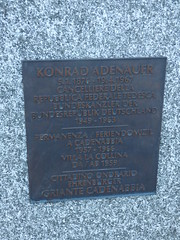Konrad Adenauer


Konrad Adenauer
(1876-1967)
Commemorated on 2 plaques
In diesem Hause wohnte von Mai 1931 bis März 1933 als Präsident des Preußischen Staatsrates Konrad Adenauer 5.1.1876 - 19.4.1967 Ehrenburger von Berlin
English translation: In this house lived from May 1931 until March 1933 as a president of the Prussian Council of State Konrad Adenauer 5.1.1876 - 19.4.1967 Ehrenburger of Berlin
Wilhelmstraße 54, Berlin, Germany where they was
Konrad Adenauer 5.1.1876 - 19.4.1967 Cancelliere della Repubblica Federale Tedesca Bundeskanzler der Bundesrepublik Deutschland 1949 - 1963 Permanenza / Feriendomizil a Cadenabbia 1957 - 1966 Villa la Collina DA / AB 1959 Cittadino Onorario Ehrenburger Griante Cadenabbia
English translation: Konrad Adenauer 05/01/1876 - 19/04/1967 Chancellor of the Federal Republic of Germany 1949 - 1963 Stayed in Cadenabbia 1957 - 1966 Villa La Collina DA / AB 1959 Honorary Citizen Ehrenburger Griante Cadenabbia
Konrad Adenauer statue - Via Statale, Griante, Italy where they stayed (1957-1966)


